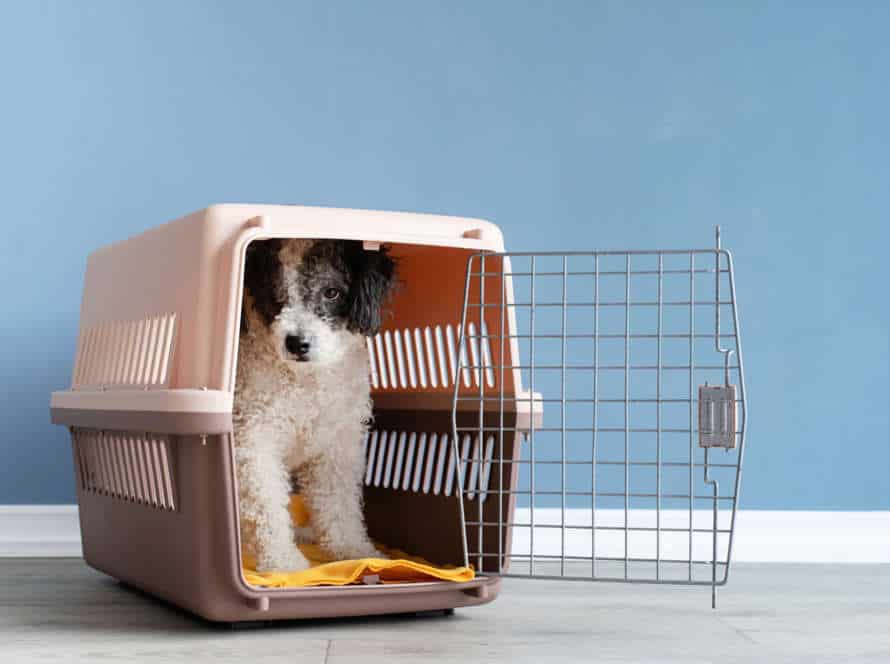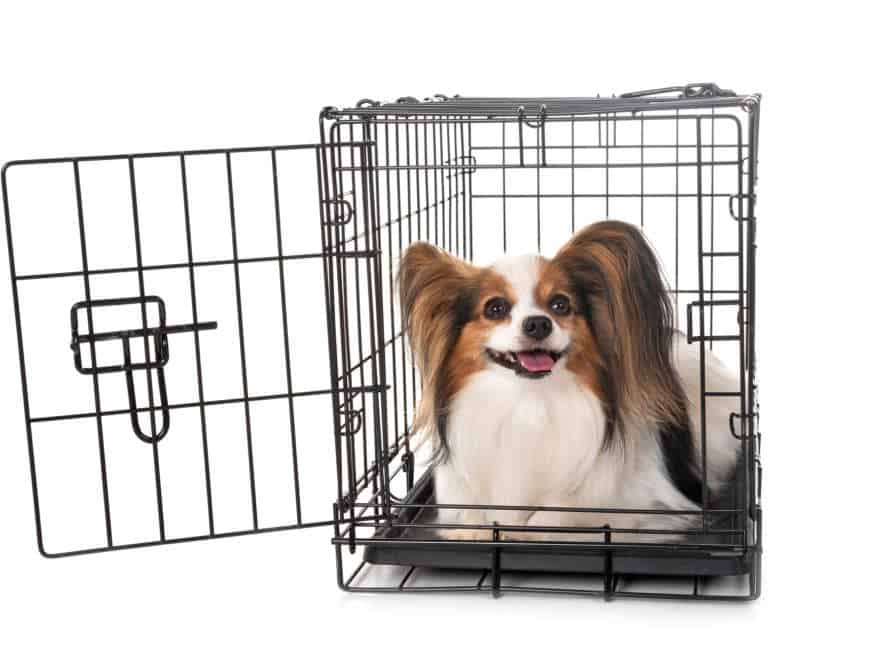Recognizing and Addressing Stress and Overstimulation in Puppies
Recognizing stress and overstimulation in puppies is key to their well-being and training. It can shape their behavior for the long term.
Signs of stress and overstimulation include:
- Pacing
- Excessive barking/whining
- Panting/drooling
- Destructive behavior
- Aggressiveness/fearfulness
To reduce stress and overstimulation:
- Provide a calm, safe space
- Stick to a regular routine for feeding, sleeping and playing
- Introduce new people and experiences gradually
- Use positive reinforcements such as treats and praise
- If things don’t improve, seek professional help.
By recognizing and addressing stress and overstimulation, you can raise a happy and well-adjusted pup!
Signs of Stress and Overstimulation in Puppies
Pups need to be healthy and well-adjusted adults, so it’s important to understand stress and overstimulation signs. Knowing these signs can help owners address the issue before it gets worse. Here’s how to recognize and address pup stress and overstimulation.
Body language cues
Body language cues are important for recognizing and addressing stress in puppies. Knowing these signs can help you help your pup quickly. Here are common signs that your pup may be stressed or overstimulated:
- Yawning, lip-llicking, and paw-lifting.
- Panting excessively, even when not hot or excited.
- Whining, growling, or barking.
- Ears pinned back, tail tucked or held high and stiff.
- Shaking or shivering.
- Cowering, hiding, or freezing.
- Destructive behavior or excessive digging.
If you notice any of these, the first thing to do is remove your pup from the environment causing them stress. Also, give them exercise, mental stimulation, and socialization in a gentle manner.
Vocalizations
Vocalizations can show your puppy is stressed or overstimulated. Knowing this can help lessen their distress and make them feel better in their surroundings. Here are a few vocalizations puppies make when stressed:
- Whining – discomfort, need for attention.
- Growling – feeling threatened, scared, or uneasy.
- Howling – anxiety, loneliness, need for attention.
- Barking – excited, trying to express something.
To address vocalizations due to stress, try to reduce overstimulation. Give them a peaceful spot to relax and introduce them to new things slowly. Have patience and reward them with praise.
Changes in behavior and habits
Stress and overstimulation are major issues in puppies. As a pet owner, you need to recognize and address the signs.
Signs of stress and overstimulation include:
- Excessive barking, whining or growling.
- Aggressive behavior like biting or snapping.
- Restlessness, pacing or hiding.
- Loss of appetite or overeating.
- Excessive chewing or scratching.
To help your puppy, identify the trigger and remove it. For instance, give them a quiet space away from loud noises or other pets. Avoid over-stimulating them with lots of toys or activities. Consult with a vet or professional dog trainer if needed.
Remember, your puppy needs patience, consistency, love and attention to stay happy and healthy.
Causes of Stress and Overstimulation in Puppies
Puppies can become overstimulated and stressed easily. When not given the right environment or stimulus, they may bark or whine too much, become lazy or quiet, and show aggression when faced with something new. To avoid this, it’s important to know what causes stress and overstimulation in puppies. This article will cover overcrowded living spaces, loud noises, and unfamiliar environments as possible causes.
Environmental factors
Environmental changes, such as alterations in routine, loud noises, and strange places can cause distress and overstimulation in puppies. It’s important to spot the signs of stress in your pup, and take action before it leads to anxiety or behavioral issues.
Signs of stress may include panting, shaking, whining, barking too much, hiding away, and destructive behavior.
To address stress and overstimulation in puppies, here are some tips:
- Give your puppy a safe and peaceful area to go to if they feel overwhelmed.
- Gradually introduce your puppy to new surroundings and experiences. Make sure to observe their reactions, to ensure they’re not getting too stressed.
- Utilize positive reinforcement training to help your puppy learn how to cope with stress and build their confidence.
- Think about using natural treatments such as calming mists, pheromone diffusers, or supplements to reduce stress levels.
Pro Tip: Have patience and consistency when aiding your puppy in dealing with stressful situations. Keep in mind to progress at your pup’s speed and offer lots of love and comfort along the way.
Socialization issues
Socialization is a must for puppies, to help them become balanced and confident dogs. But, puppies can be stressed and overstimulated, stopping their socialization.
Stress and overstimulation in puppies can be caused by changes in their environment, too much handling, or being exposed to intimidating new situations.
These stressors can lead to physical reactions like panting, shaking, or whining. And, behavioral changes like less appetite, aggression, or avoidance.
Recognizing and avoiding triggers is the first step to managing stress and overstimulation in puppies. Gradual exposure to new situations, positive reinforcement, and providing a safe and quiet environment will help.
Regular exercise and playtime, mental stimulation, and professional advice are also great ways to promote healthy socialization.
Health problems
Stress and overstimulation can cause many health issues in puppies – physical and emotional. It is a must to recognize these signs and take action before they get worse.
Causes may vary – changes in routine, lack of socialization, loud noises, separation anxiety, too much exercise and stimulation.
Signs of stress and overstimulation can be panting, whining, shaking, hiding, growling, biting and destructive behaviour.
To tackle this, we need to identify the source and lessen it if possible. Providing a secure and tranquil space, giving pups enough exercise, introducing new experiences step by step and using positive reinforcement training are some ways to help.
Pro Tip: Puppies are easily affected by stress and overstimulation, so it’s important to create a tranquil and nurturing environment for them.
Prevention of Stress and Overstimulation in Puppies
Pups are starting to discover their world. To make sure your puppy is growing well, it’s important to understand what makes them stressed or over-excited. Knowing this and how to stop it will help your pup reach their full potential.
Here’s how to spot and manage stress and overstimulation in puppies.
Keep a regular routine
Having a solid routine is essential to avoid stress and overstimulation in puppies. They love predictability and structure. So, a regular routine can help keep them relaxed and balanced. Here are some tips to form one:
- Consistently stick to meal and potty breaks. This will help your pup learn when to eat, and set up good potty habits.
- Designate a quiet spot for your pup to go to when feeling overwhelmed or worn out.
- Try not to let your puppy meet new people or go to new places until they are comfortable in their new home.
- Keep a consistent sleep schedule to help your pup have a healthy sleep pattern.
By having a regular routine, you can bring order and predictability to your pup’s life. Which can stop stress and overstimulation.
Proper socialization
Socializing a pup correctly is essential for avoiding stress and over-excitement. Here’s how to do it:
- Start at 3-4 weeks.
- Introduce them slowly to new people, places and other animals.
- Keep sessions fun and short.
- Reward them with treats to create positive associations.
- Be aware of signs of stress or over-stimulation (panting, whining, pacing or hiding).
- If these signs appear, take your pup away from the situation.
- Ask your vet or a professional dog trainer for advice.
- Remember: Early, correct socialization prevents later behavior issues.
Create a safe and comfortable environment
Creating a secure and cozy atmosphere for your pup is important to stop stress and overstimulation which can hurt their mental and physical wellbeing. Overstimulation happens when your pup gets too excited or overwhelmed, leading to unmanageable or aggressive actions. Here are some advice for creating a safe and comfortable environment for your puppy:
- Give your pup a particular spot to chill and withdraw.
- Restrict exposure to noisy sounds, unfamiliar people or animals, and new and overwhelming encounters.
- Apply a kind and positive training method to keep away fear or anxiety responses.
- Make sure there are lots of chances for exercise and play in a safe and regulated atmosphere.
- If you observe any symptoms of stress or overstimulation in your pup, like loud barking, panting, or destructive behavior, ask for professional help.
Remember that a safe and cozy environment helps your pup to grow and become a content and healthy dog.
Treatment and Management of Stress and Overstimulation in Puppies
Stress and overstimulation in puppies can be hard to spot. And, if not treated, it can cause more serious issues. So, it’s essential to know the signs and take action. This section will tell you how to recognize and treat stress and overstimulation in puppies. Plus, you’ll get tips on how to stop it from happening.
Remove or manage stressors
Puppies can be prone to stress and overstimulation. This can affect their health and behaviour in a bad way. So, it is important for owners to understand the causes of stress and address them. Here are some ways to do this:
- Identify what could be causing stress, e.g. loud noises, too much playtime, or strange people or places.
- Minimize exposure to these stressors. Create a quiet and safe space, limit playtime and introduce new people and places gradually.
- Use positive reinforcement training. This helps the puppy to cope with stressors and boosts their confidence.
- Be kind and patient. And if needed, get professional help.
By dealing with or removing stressors, you will create an environment where the puppy can be healthy and happy.
Use positive reinforcement training
Positive reinforcement training is a great way to help puppies manage stress and overstimulation. Rewards like treats, verbal praise, and toys are used to motivate puppies to repeat desirable behaviors.
To use positive reinforcement training:
- Identify which behaviors you want to encourage.
- Create clear, consistent goals and milestones.
- Choose fitting rewards for your pup.
- Maintain a consistent voice and body language.
- Be patient and persistent, avoiding punishment-based techniques.
By doing this, puppies can learn new behaviors, build confidence, and reduce stress.
Seek professional help if necessary
Recognizing and addressing puppy stress and overstimulation is vital to avoid future behaviour problems. Signs that a puppy is overstimulated may include: barking, chewing, aggression and avoidance. Treatment may need to include behaviour modification and medication. Professional help should be sought if the issue continues or the owner needs guidance. A vet or animal behaviourist can provide a personalised treatment plan.
Frequently Asked Questions
1. How do I recognize stress in my puppy?
Some signs of stress in puppies include excessive panting, whining or whimpering, hiding or cowering, pacing or restlessness, loss of appetite, and avoidance or fear of certain people, objects or situations.
2. What causes stress and overstimulation in puppies?
Puppies may experience stress and overstimulation due to changes in their environment, lack of socialization, inadequate exercise or mental stimulation, fear, or contact with other animals that may intimidate or scare them.
3. How can I address stress and overstimulation in my puppy?
You can address stress and overstimulation in your puppy by providing a calm and predictable environment, scheduling regular exercise and playtime, gradually introducing new experiences, and seeking professional help if necessary.
4. Is it normal for puppies to exhibit stress and overstimulation?
Yes, it is normal for puppies to experience bouts of stress and overstimulation given their developmental stage and penchant for exploration. However, you should be vigilant about managing and reducing these episodes to prevent negative long-term effects.
5. Can stress and overstimulation impact my puppy’s health?
Yes, chronic stress and overstimulation in puppies can lead to various physical, emotional, and behavioral problems, including anxiety, aggression, and decreased immunity, among others.
6. What can I do to prevent stress and overstimulation in my puppy?
To prevent stress and overstimulation in your puppy, establish a consistent routine, provide plenty of opportunities for socialization and mental stimulation, ensure proper nutrition and hygiene, and seek help from a professional trainer or veterinarian if needed.







